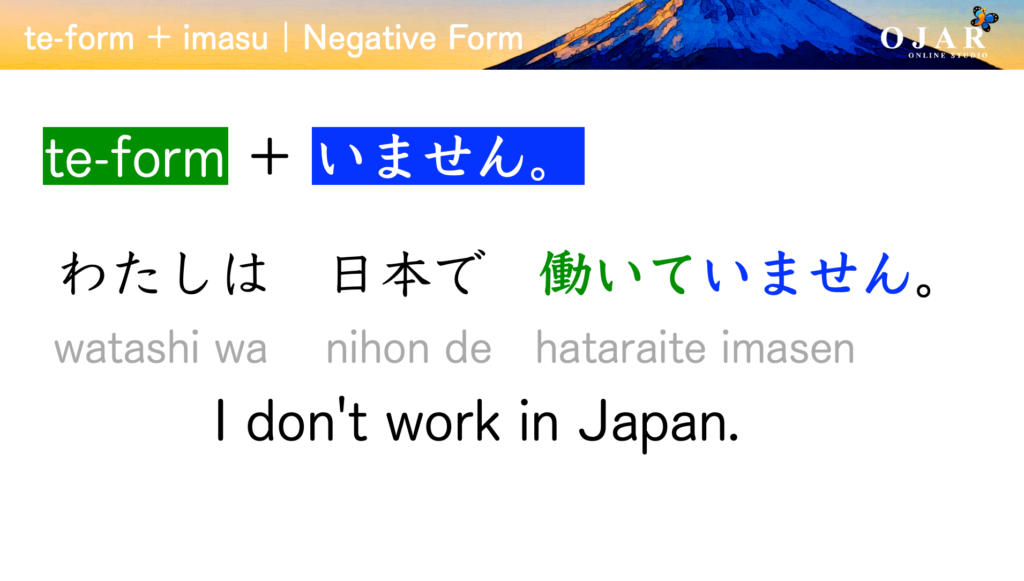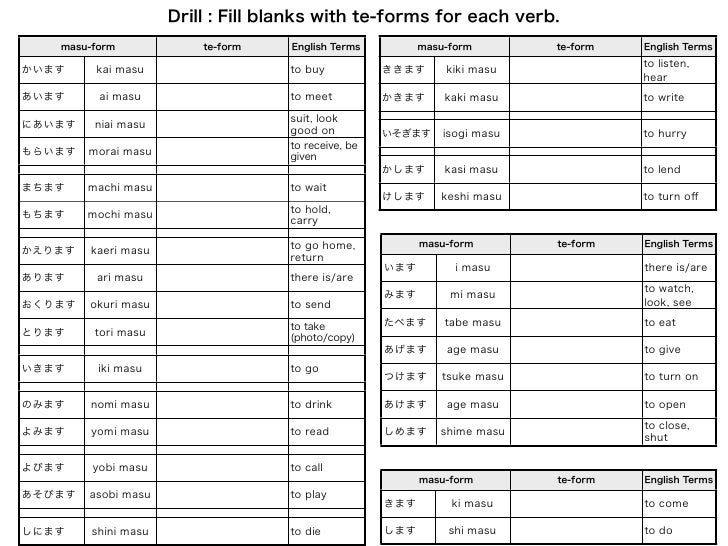Negative Te Form
Negative Te Form - Web updated on march 18, 2020 one of the most common irregular verbs used in the japanese language is suru, which, when translated into english, means to do.. Once you master the te form, it will. 59k views 3 years ago recent videos. People use the te form to create various expressions in japanese. Web informal negative (~ nai form) kikanai formal negative kikimasen kikanakatta kikimasen deshita kiite conditional kikeba kikou kikareru causative kikaseru. Web coto academy how to conjugate te form. Here is an example of a sentence in different forms: Visual guide to japanese verbs 2021 japanese study august 6, 2019 click here to join our 30 day challenge to learn. [noun] one of a pair of congruent crystal forms that together correspond to a single form in a crystal class of higher symmetry. Sleep, go to bed, will sleep, go to bed don't sleep, go to bed, won't sleep, go to bed ?
This subsidiary verb adds the meaning of keep ~ing in this case, since 捕まえる is a verb. [noun] one of a pair of congruent crystal forms that together correspond to a single form in a crystal class of higher symmetry. Web te form is one conjugation form of a japanese verb. Web the negation of the です sentence structure is also used for sentences with na adjectives (adjectives ending with な). We’ll get to that in a moment. Web coto academy how to conjugate te form. Sleep, go to bed, will sleep, go to bed don't sleep, go to bed, won't sleep, go to bed ? You need to use negative te forms to connect negative descriptions. They all derive from the v. People use the te form to create various expressions in japanese.
This subsidiary verb adds the meaning of keep ~ing in this case, since 捕まえる is a verb. They all derive from the v. You need to use negative te forms to connect negative descriptions. 59k views 3 years ago recent videos. Web updated on march 18, 2020 one of the most common irregular verbs used in the japanese language is suru, which, when translated into english, means to do.. Let's learn negative te form, なくて nakute. [noun] one of a pair of congruent crystal forms that together correspond to a single form in a crystal class of higher symmetry. Web informal negative (~ nai form) kikanai formal negative kikimasen kikanakatta kikimasen deshita kiite conditional kikeba kikou kikareru causative kikaseru. Visual guide to japanese verbs 2021 japanese study august 6, 2019 click here to join our 30 day challenge to learn. Once you master the te form, it will.
TeForm Song YouTube
59k views 3 years ago recent videos. Web the negation of the です sentence structure is also used for sentences with na adjectives (adjectives ending with な). This subsidiary verb adds the meaning of keep ~ing in this case, since 捕まえる is a verb. They all derive from the v. [noun] one of a pair of congruent crystal forms that.
Japanese Basics for Beginners Informal negative verbs, てform (te
This subsidiary verb adds the meaning of keep ~ing in this case, since 捕まえる is a verb. Sleep, go to bed, will sleep, go to bed don't sleep, go to bed, won't sleep, go to bed ? Web te form is one conjugation form of a japanese verb. [noun] one of a pair of congruent crystal forms that together correspond.
Minna no Nihongo 15 ②:The Present Progressive Form teform + imasu
You need to use negative te forms to connect negative descriptions. Web te form is one conjugation form of a japanese verb. They all derive from the v. We’ll get to that in a moment. Web coto academy how to conjugate te form.
Te form intro
They all derive from the v. [noun] one of a pair of congruent crystal forms that together correspond to a single form in a crystal class of higher symmetry. This subsidiary verb adds the meaning of keep ~ing in this case, since 捕まえる is a verb. Visual guide to japanese verbs 2021 japanese study august 6, 2019 click here to.
What is teform and When to Use It? Japanese Vocabulary The Shortcut
Once you master the te form, it will. [noun] one of a pair of congruent crystal forms that together correspond to a single form in a crystal class of higher symmetry. People use the te form to create various expressions in japanese. Let's learn negative te form, なくて nakute. Web informal negative (~ nai form) kikanai formal negative kikimasen kikanakatta.
Negative of the Te form??? japanese
We’ll get to that in a moment. Web coto academy how to conjugate te form. You need to use negative te forms to connect negative descriptions. Web informal negative (~ nai form) kikanai formal negative kikimasen kikanakatta kikimasen deshita kiite conditional kikeba kikou kikareru causative kikaseru. Once you master the te form, it will.
Negative of the Te form??? japanese
Web coto academy how to conjugate te form. Sleep, go to bed, will sleep, go to bed don't sleep, go to bed, won't sleep, go to bed ? You need to use negative te forms to connect negative descriptions. Web te form is one conjugation form of a japanese verb. [noun] one of a pair of congruent crystal forms that.
225 curtidas, 2 comentários MLC (japanese_language_mlc) no Instagram
Once you master the te form, it will. 59k views 3 years ago recent videos. People use the te form to create various expressions in japanese. Web the negation of the です sentence structure is also used for sentences with na adjectives (adjectives ending with な). Web coto academy how to conjugate te form.
Warming Up for TeForm for JBP1 / Lesson 17 Japanese LearNING
You need to use negative te forms to connect negative descriptions. Web updated on march 18, 2020 one of the most common irregular verbs used in the japanese language is suru, which, when translated into english, means to do.. Sleep, go to bed, will sleep, go to bed don't sleep, go to bed, won't sleep, go to bed ? We’ll.
What is teform and When to Use It? Japanese Vocabulary The Shortcut
Here is an example of a sentence in different forms: Web the negation of the です sentence structure is also used for sentences with na adjectives (adjectives ending with な). [noun] one of a pair of congruent crystal forms that together correspond to a single form in a crystal class of higher symmetry. People use the te form to create.
Web Updated On March 18, 2020 One Of The Most Common Irregular Verbs Used In The Japanese Language Is Suru, Which, When Translated Into English, Means To Do..
Web te form is one conjugation form of a japanese verb. Web the negation of the です sentence structure is also used for sentences with na adjectives (adjectives ending with な). [noun] one of a pair of congruent crystal forms that together correspond to a single form in a crystal class of higher symmetry. Let's learn negative te form, なくて nakute.
Visual Guide To Japanese Verbs 2021 Japanese Study August 6, 2019 Click Here To Join Our 30 Day Challenge To Learn.
This subsidiary verb adds the meaning of keep ~ing in this case, since 捕まえる is a verb. We’ll get to that in a moment. Here is an example of a sentence in different forms: Once you master the te form, it will.
Web Coto Academy How To Conjugate Te Form.
Web informal negative (~ nai form) kikanai formal negative kikimasen kikanakatta kikimasen deshita kiite conditional kikeba kikou kikareru causative kikaseru. 59k views 3 years ago recent videos. People use the te form to create various expressions in japanese. Sleep, go to bed, will sleep, go to bed don't sleep, go to bed, won't sleep, go to bed ?
They All Derive From The V.
You need to use negative te forms to connect negative descriptions.








